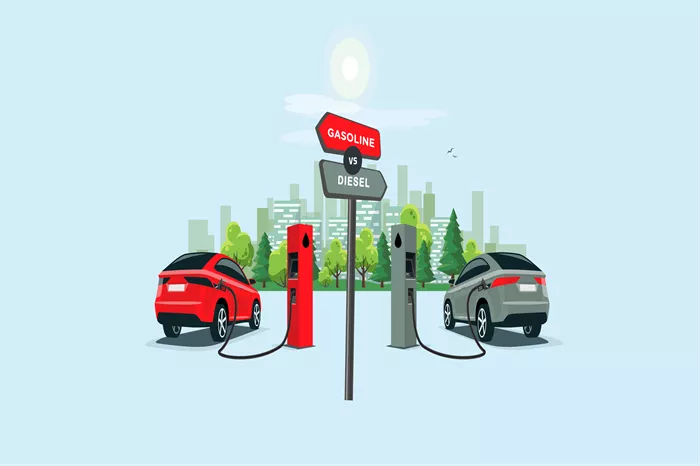In the realm of transportation fuels, diesel and gasoline have long been at the forefront of discussions regarding environmental impact. As society increasingly prioritizes sustainability and environmental stewardship, determining which fuel holds the upper hand in terms of environmental benefits becomes crucial. Both diesel and gasoline have their proponents and critics, with each fuel type offering distinct advantages and drawbacks in terms of emissions, energy efficiency, and overall environmental impact.
Understanding Diesel and Gasoline
Diesel and gasoline are both derived from crude oil through refining processes, but they differ significantly in their chemical composition and properties. Diesel fuel is denser and contains more energy per gallon compared to gasoline, which contributes to its higher efficiency in certain types of engines. On the other hand, gasoline is lighter and more volatile, making it suitable for spark-ignition engines commonly found in cars and light-duty vehicles.
Greenhouse Gas Emissions
One of the primary concerns regarding fossil fuels is their contribution to greenhouse gas (GHG) emissions, particularly carbon dioxide (CO2), which is a major driver of climate change. In this regard, diesel and gasoline exhibit different emission profiles throughout their life cycles, from extraction and refining to combustion in vehicles.
Diesel Emissions
Diesel engines are known for their higher efficiency and lower CO2 emissions per mile compared to gasoline engines. This efficiency advantage is partly due to diesel’s higher energy density and the inherent efficiency of diesel engines themselves, which operate at higher compression ratios. However, diesel engines produce higher levels of nitrogen oxides (NOx) and particulate matter (PM), which are associated with respiratory and environmental health impacts.
Gasoline Emissions
Gasoline engines, while generally less efficient than diesel engines, have made significant strides in reducing emissions over the past few decades. Modern gasoline vehicles are equipped with emissions control technologies such as catalytic converters and advanced engine management systems, which help reduce CO2, NOx, and PM emissions. However, gasoline combustion still contributes to CO2 emissions that contribute to climate change.
Air Quality and Local Environmental Impact
Beyond GHG emissions, both diesel and gasoline combustion affect local air quality, particularly in urban areas where vehicular emissions can concentrate. Diesel engines, due to their higher emissions of NOx and PM, have been historically associated with poorer air quality in cities. PM emissions from diesel engines are particularly concerning because of their potential health effects, including respiratory and cardiovascular issues.
Gasoline engines, while generally cleaner in terms of PM emissions, still contribute to localized air pollution through the formation of ground-level ozone and other pollutants. The extent of these impacts depends on factors such as vehicle technology, fuel quality, and driving conditions.
See also: Top 7 Environmental Impacts Of Gasoline
Energy Efficiency and Fuel Consumption
Energy efficiency is a critical factor in evaluating the environmental impact of diesel versus gasoline. Diesel engines typically achieve higher thermal efficiency due to their higher compression ratios and the nature of diesel combustion. This means that diesel vehicles can travel farther on a gallon of fuel compared to gasoline vehicles, all else being equal.
However, improvements in gasoline engine technology, such as turbocharging and direct fuel injection, have narrowed the efficiency gap between diesel and gasoline engines in recent years. Hybrid and electric vehicle technologies further complicate the comparison by offering alternatives that significantly reduce or eliminate tailpipe emissions altogether.
Renewable and Alternative Fuels
The future of transportation fuels is increasingly focused on renewable and alternative options that promise lower carbon footprints and reduced environmental impacts compared to traditional fossil fuels. Biofuels, such as biodiesel and ethanol, offer potential replacements for diesel and gasoline derived from petroleum. These fuels can be produced from organic materials such as crops, agricultural residues, and waste oils, reducing reliance on finite fossil fuel resources.
Electric vehicles (EVs), powered by batteries or hydrogen fuel cells, represent another promising alternative to internal combustion engines. EVs produce zero tailpipe emissions and have the potential to significantly reduce overall GHG emissions when paired with renewable electricity generation.
Policy and Regulatory Landscape
Government policies and regulations play a crucial role in shaping the environmental impacts of diesel and gasoline fuels. Emission standards, fuel efficiency regulations, and incentives for alternative fuels and vehicles influence the choices made by automakers, fuel providers, and consumers alike. Countries around the world are increasingly adopting stricter emissions standards and promoting cleaner technologies to mitigate the environmental impacts of transportation.
Conclusion
Determining whether diesel or gasoline is better for the environment involves considering a complex array of factors, from greenhouse gas emissions and air quality to energy efficiency and regulatory frameworks. While diesel engines offer advantages in fuel efficiency and lower CO2 emissions per mile, they also produce higher levels of NOx and PM, impacting local air quality and public health. Gasoline engines, while cleaner in terms of some emissions, still contribute significantly to overall GHG emissions and local air pollution.
As the world transitions toward a more sustainable transportation future, both diesel and gasoline will continue to play roles in the energy mix, albeit with increasing scrutiny and regulation aimed at reducing their environmental footprints. The rise of alternative fuels and electric vehicles underscores a broader shift toward cleaner and more efficient transportation technologies. Ultimately, the choice between diesel and gasoline hinges not only on technical considerations but also on societal priorities and environmental goals aimed at combating climate change and improving air quality for future generations.
Related topics:
Diesel Or Gasoline: Which Is Safer?

